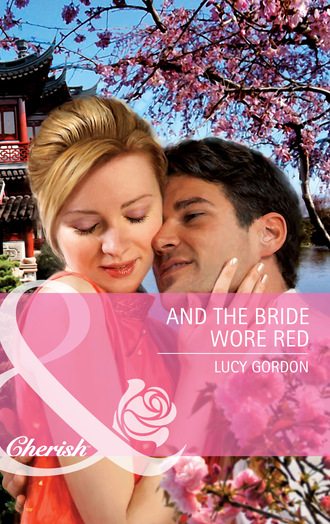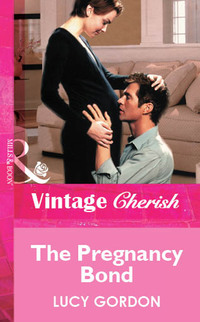
Полная версия
And the Bride Wore Red
‘Of course,’ Olivia agreed with a touch of bitterness that passed her mother by. ‘And if I start claiming you as my mother it spoils the effect.’
‘Exactly!’ Melisande beamed, entirely missing the irony in her daughter’s voice. ‘You can call me Melly if you like.’
‘Gosh, thanks, Mum.’
Her mother gave her a sharp look but didn’t make the mistake of replying.
That evening, she told Norah, who was disgusted.
‘Fuddy-duddy! She means I don’t live my life at the mercy of every wind that blows.’
‘She just thinks you know nothing about love,’ Olivia pointed out.
When Norah didn’t answer, she persisted, ‘But she’s wrong, isn’t she? There’s someone you never talk about.’
That was how she’d first heard about Edward, who’d died so long ago that nobody else remembered him, or the volcano he’d caused in the life of the girl who’d loved him. Norah told her only a little that night, but more later on, as Olivia grew old enough to understand.
Norah had been eighteen when she’d met Edward, a young army-officer, nineteen when they’d celebrated his promotion by becoming engaged, and twenty when he’d died, far away in another country. She had never loved another man.
The bleak simplicity of the story shocked Olivia. Later she learned to set it beside her own parents’ superficial romances, and was equally appalled by both.
Had that lesson hovered somewhere in her mind when she too had fallen disastrously in love?
Looking back, she could see that her life-long cynicism about emotion, far from protecting her, had left her vulnerable. She’d determinedly avoided the youthful experiences on which most girls cut their romantic teeth, proud of the way her heart had never been broken because she’d never become involved. But it meant that she’d had no yardstick by which to judge Andy, no caution to warn her of signs that other women would have seen. Her capitulation to him had been total, joyful, and his betrayal had left her defenceless.
She’d fled, seeking a new life here in China, vowing never to make the same mistake again. From now on men would no longer exist. Neither would love, or anything that reminded her of ‘the whole romantic nonsense’ as she inwardly called it. And so she would be safe.
On that comforting thought, she fell asleep.
But tonight her sleep was mysteriously disturbed. Phantoms chased through her dreams, making her hot and cold by turns, causing her blood to race and her heart to pound. She awoke abruptly to find herself sitting up in bed, not knowing when it had happened, not knowing anything, except that suddenly there was no safety in all the world.
Chapter Two
THE next day Olivia felt down from the moment she awoke. The sight of herself in the bathroom mirror was off-putting. Where was the vibrant young woman in her twenties with a slender figure, rich, honey-coloured hair and large blue eyes that could say so much?
‘I don’t think she ever really existed,’ she informed her reflection gloomily. ‘You’re the reality.’
She wondered if she might still be in shock from her nasty fall, but dismissed that as just making excuses.
‘I’m a hag,’ she muttered. ‘I look older than I am. I’m too thin, and my hair is just plain drab. I’ll be going grey next.’
The woman in the mirror stared back, offering not a glimmer of sympathy. Normally Olivia wore her wavy hair long and bouncy but today she pulled it back into an efficient-looking bun. It suited her mood.
The day continued to be glum for no apparent reason. Her students were attentive and well-behaved, lunch was appetizing and her friends on the staff made kindly enquiries as to her health. Mrs Wu even tried to send her home.
‘It’s a reaction to that fall,’ she said. ‘Go home and rest.’
‘Dong doesn’t seem to need rest,’ Olivia pointed out. ‘I actually had to stop him trying to climb that tree again.’
‘It’s up to you,’ the headmistress said sympathetically. ‘But feel free to leave when you feel like it.’
She stuck it out to the end of the day, tired and grumpy, wanting to go home yet not looking forward to the empty apartment. Finally she delivered some papers to the headmistress and slipped out of the building by a side door, instead of the main entrance that she would normally have used. Then she stopped, arrested by the sight that met her eyes.
Dr Mitchell was there.
Now she knew that this moment was always meant to happen.
He was sitting on a low wall near the main entrance. Olivia paused for a moment just as he rose and began to pace restlessly and look at the main door as though expecting somebody to come through it. Occasionally he consulted his watch.
She backed off until she was in shadow under the trees, but still able to see him clearly. She realised that her view of him the day before had been constricted by the surroundings of his office. He was taller than she remembered, not muscular, but lean with a kind of casual elegance that yet hinted at tension and control.
Yesterday he’d been in command on his own territory. Now he was uncertain.
She began to walk towards him, calling, ‘Can I help you?’
His face brightened at once, convincing her that she was the one he’d been awaiting. Mysteriously the day’s cares began to fall away from her.
‘I thought I’d drop in to see how my patients are,’ he said, moving towards her.
‘Do you always do follow-up visits from the clinic?’
He shook his head. His eyes were mischievous.
‘Just this time,’ he said.
‘Thank you. Dong has already gone home, but he’s fine.’
‘But what about you? You were hurt as well.’
‘It was only a few scratches, and I was cared for by an excellent doctor.’
He inclined his head in acknowledgement of her compliment, and said, ‘Still, perhaps I should assure myself that you’re really well.’
‘Of course.’ She stood back to let him enter the building, but he shook his head.
‘I have a better idea. There’s a little restaurant not far from here where we can talk in peace.’
His smile held a query, asking if she would go along with his strategy, and she hurried to reassure him, smiling in return and saying, ‘What a lovely idea!’
‘My car’s just over there.’
To her pleasure he drove to a place that had a look that she thought of as traditionally Chinese. Much of Beijing had been rebuilt in a modern style, but she yearned for the old buildings with their ornate roofs turning up at the corners. Here she found them glowing with light from the coloured lamps outside.
The first restaurant they came to was full. So was the second.
‘Perhaps we should try—’
He was interrupted by a cheerful cry. Turning, they saw a young man hailing him from a short distance away, and urgently pointing down a side street. He vanished without waiting to see if they followed him.
‘We’re caught,’ her companion said ruefully. ‘We’ll have to go to the Dancing Dragon.’
‘Isn’t it any good?’
‘It’s the best—but I’ll tell you later. Let’s go.’
There was no mistaking the restaurant. Painted dragons swirled on the walls outside, their eyes alight with mischief. Inside was small and bright, bustling with life and packed.
‘They don’t have any tables free,’ she murmured.
‘Don’t worry. They always keep one for me.’
Sure enough the man from the street reappeared, pointing the way to a corner and leading them to a small, discreet table tucked away almost out of sight. It had clearly been designed for lovers, and Lang must have thought so too, because he gave a hurried, embarrassed mutter, which Olivia just managed to decipher as, ‘Do you have to be so obvious?’
‘Why not?’ the waiter asked, genuinely baffled. ‘It’s the table you always have.’
Olivia’s lips twitched as she seated herself in the corner, but she controlled her amusement. Dr Mitchell was turning out to be more interesting than she would have guessed.
The restaurant was charming, the lanterns giving out a soft, red light, the walls covered in dragons. She regarded them in delight. Dragons had been part of her love affair with China ever since she’d discovered their real nature.
Raised in England, the only dragon she’d heard of had been the one slain by St George, a devil breathing fire and death, ravaging villages, demanding the sacrifice of innocent maidens, until the heroic knight George had overcome him and become the country’s patron saint as a result.
In China it was different. Here the dragon had always been the harbinger of good luck, wealth, wisdom, a fine harvest. Delightful dragons popped up in every part of life. They danced at weddings, promenaded in parades, breathing their friendly fire and spreading happiness. They were all around her now.
Perhaps that was why she suddenly felt better than she’d done all day. There surely couldn’t be any other reason.
Looking at a dragon painted onto a mirror, she caught sight of her own reflection and realised that her hair was still drawn back severely, which no longer felt right. With a swift movement she pulled at the pins until her tresses were freed, flowing lusciously again, in keeping with her lighter mood.
The dragon winked at her.
While Dr Mitchell was occupied with the waiter, Olivia remembered a duty that she must perform without delay. Whenever she was unable to make computer contact with Norah she always called to warn her so that the old woman wouldn’t be left waiting in hope. Quickly she used her mobile phone and in a moment she heard Norah’s voice.
‘Just to let you know that I’m not at home tonight,’ she said.
‘Jolly good,’ Norah said at once, as Olivia had known she would say. ‘You should go out more often, not waste time talking to me.’
‘But you know I love talking to you.’
‘Yes, I do, but tonight you have more important things to think of. At least, I hope you have. Goodnight, darling.’
‘Goodnight, my love,’ Olivia said tenderly.
She hung up to find her companion regarding her with a little frown.
‘Have I created a problem?’ he asked delicately. ‘Is there someone who—’ he paused delicately ‘—would object to your being with me?’
‘Oh, no! I was talking to my elderly aunt in England. There’s nobody who can tell me who to be with.’
‘I’m glad,’ he said simply.
And she was glad too, for suddenly the shadows of the day had lifted.
‘Dr Mitchell—’
‘My name is Lang.’
‘And mine is Olivia.’
The waiter appeared with tea, filling Olivia’s cup, smiling with pleased surprise as she gave the traditional thank-you gesture of tapping three fingers on the table.
‘Most Westerners don’t know to do that,’ Lang explained.
‘It’s the kind of thing I love,’ she said. ‘I love the story too—about the emperor who went to a teahouse incognito with some friends and told them not to prostrate themselves before him because it would give away his identity. So they tapped their fingers instead. I don’t want to stand out. It’s more fun fitting in.’
When the first dishes were laid out before them, including the rice, he observed her skill using chopsticks.
‘You really know how to do that,’ he observed as they started to eat. ‘You must have been in China for some time.’
He spoke in Mandarin Chinese and she replied in the same language, glad to demonstrate that she was as expert as he.
‘About six months,’ she said. ‘Before that I lived in England most of the time.’
‘Most?’
‘I’ve always travelled a lot to improve my languages. They were all I was ever good at, so I had to make the most of them.’
‘How many languages do you speak?’
‘French, German, Italian, Spanish…’
‘Hey, I’m impressed. But why Chinese?’
‘Pure show-off,’ she chuckled. ‘Everyone warned me it was difficult, so I did it for the fun of proving that I could. That showed ‘em!’
‘I’ll bet it did,’ he said admiringly, reverting to English. ‘And I don’t suppose you found it difficult at all.’
‘Actually, I did, but I kept that to myself. You’re the only person I’ve ever admitted that secret to.’
‘And I promise not to reveal it,’ he said solemnly. ‘On pain of your never speaking to me again.’
She didn’t have to ask what he meant by that. They both knew that the connection between them had been established in those few minutes of devastating consciousness in his surgery, and today he’d come looking for her because he had to.
Olivia thought back to last night, to the disturbance that had haunted her dreams, waking her and refusing to let her sleep again. Instinct told her that it had been the same with him.
They might spend no more than a few fleeting hours in each other’s company, or they might travel a little distance along the road together. Neither could know. But they had to find out.
‘So you came out here to improve your Chinese?’ he asked in a tone that suggested there must be more to it.
‘Partly, but I needed to get away from England for a while.’
He nodded, understanding at once. ‘Was he a real louse?’
‘I thought so at the time, but I think now I had a lucky escape. He almost made me forget my prime directive. But when I discovered what a louse he really was, I realised that the prime directive had been right all the time.’
‘Prime directive,’ he mused, his eyes glinting with amusement. ‘Now, let me see—what would that be? “Only learning matters.” “Life can be reduced to graphs on a page.” How am I doing?’
‘You’re part of the way there, but only part. Beware people, beware relationships—’
‘Beware men!’
‘Hey, you guessed.’
‘It was obviously what you were building up to. Are we all condemned?’
‘It’s not that simple. I don’t just condemn men, I blame women, as well.’
‘Well, that seems to take care of the entire human race. Having disposed of the whole lot of them, let’s go on eating.’
His wryly mocking tone made her laugh.
‘My parents were both wild romantics,’ she went on, ‘and I can’t tell you what a misfortune that is.’
‘You don’t need to. Romance isn’t supposed to be for parents. Their job is to be severe and straight-laced so that their kids have a safety net for indulging in mad fantasies.’
‘Right!’ she said, relieved at his understanding. ‘According to Aunt Norah it was love at first sight, then a whirlwind romance—moon rhyming with June. All that stuff.’
Lang regarded her curiously. Something edgy in the way she’d said all that stuff had alerted him.
‘What happened?’
‘She was seventeen, he was eighteen. Nobody took it seriously at first, just kids fooling around. But then they wanted to get married. The parents said no. He had to go to college. So she got pregnant—on purpose, Norah thinks. They ended up making a runaway marriage.’
‘Wonderfully romantic,’ Lang supplied. ‘Until they came down to earth with a bump. He had to get a job, she found herself with a crying baby….’
‘Apparently I cried more than most—for no reason, according to my mother.’
‘But babies can sense things. You must have known instinctively that she was dissatisfied, wanting to go out and enjoy herself, and your father probably blamed her for his blighted careerprospects.’
She stared at him, awed by this insight.
‘That’s exactly how it was. At least, that’s how Norah says it was. I don’t remember, of course, except that I picked up the atmosphere without knowing why. There was lots of shouting and screaming.
‘It got worse because they both started having affairs. At last they divorced, and I found I didn’t really have a home. I stayed with her, or with him, but I always felt like a guest. If there was a new girlfriend or new boyfriend I’d be in the way and I’d stay with Norah. Then the romance would break up and my mother would cry on my shoulder.’
‘So you became her mother,’ Lang observed.
‘Yes, I suppose I did. And, if that was what romance did to you, I decided I didn’t want it.’
‘But wasn’t there anyone else in your family to show you a more encouraging view of love? What about Norah?’
‘She’s the opposite to them. Her fiancé died years ago. There’s been nobody else for her since, and she’s always told me that she’s perfectly content. She says once you’ve found the right man you can’t replace him with anyone else.’
‘Even when she’s lost him?’
‘But according to Norah she hasn’t lost him. He loved her to the end of his life, so she feels that they still belong to each other.’
‘And you disapprove?’ he asked, frowning a little.
‘It sounds charming, but it’s really only words. The reality is that it’s turned Norah’s life into a desert that’s lasted fifty years.’
‘Perhaps it hasn’t. Do you really know what’s inside her heart? Perhaps it’s given her a kind of fulfilment that we can’t understand.’
‘Of course you could be right, but if that’s fulfilment…’ She finished with a sigh. ‘I just want more from life than dreaming about a man who isn’t there any more. Or,’ she added wryly, ‘in my mother’s case, several men who aren’t there any more.’
‘But what about the louse? Didn’t he change your mind?’
For the first time he saw her disconcerted.
‘I kind of lost the plot there,’ she admitted. ‘But it sorted itself out. Never mind how. I’m wiser now.’
She spoke with a shrug and a cheerful smile, but she had the feeling that he wasn’t fooled. Some instinct was telling him the things she wouldn’t, couldn’t say.
She’d been dazzled by Andy from the first moment. Handsome, charming, intelligent, he’d singled her out, wooed her passionately and had overturned all the fixed ideas of her life. For once she’d understood Norah’s aching fidelity to a dead man. She’d even partly understood the way her mother fell in love so often.
Then, just when she’d been ready to abandon the prejudices of a lifetime, he’d announced that he was engaged to marry someone else. He’d said they’d had a wonderful few months together but it was time to be realistic, wasn’t it?
The lonely, anguished nights that had followed had served to convince her that she’d been right all the time. Love wasn’t for her, or for anyone in their right mind. She couldn’t speak of it, but there was no need. Lang’s sympathetic silence told her that he understood.
‘Tell me about you,’ she hastened to say. ‘You’re English too, aren’t you? What brought you out here?’
‘I’m three-quarters English. The other quarter is Chinese.’
‘Ah,’ she said slowly.
‘You guessed?’
‘Not exactly. You sound English, but your features suggest otherwise. I don’t know—there’s something else…’
She gave up trying to explain. The ‘something else’ in his face seemed to come and go. One moment it almost defined him, the next it barely existed. It intrigued and tempted her with its hint of another, mysterious world.
‘Something different—but it’s not a matter of looks,’ she finished, wishing she could find the right words.
He seemed satisfied and nodded.
‘I know. That “something different” is inside, and it has always haunted me,’ he said. ‘I was born in London, and I grew up there, but I knew I didn’t quite fit in with the others. My mother was English, my father was half-Chinese. He died soon after I was born. Later my mother married an Englishman with two children from a previous marriage.’
‘Wicked stepfather?’ Olivia enquired.
‘No, nothing so dramatic. He was a decent guy. I got on well with him and his children, but I wasn’t like them, and we all knew it.
‘Luckily I had my grandmother, who’d left China to marry my grandfather. Her name was Lang Meihui before she married, and she was an astonishing woman. She knew nothing about England and couldn’t speak the language. John Mitchell couldn’t speak Chinese. But they managed to communicate and knew that they loved each other. He brought her home to London.’
‘She must have found it really hard to cope,’ Olivia mused.
‘Yes, but I’ll swear, nothing has ever defeated her in her life. She learned to speak English really well. She found a way to live in a country that probably felt like being on another planet, and she survived when her husband died ten years later, leaving her with a son to raise alone.
‘He was called Lang too. She’d insisted on that. It was her way of keeping her Chinese familyname alive. When I was born she more or less bullied him into calling me Lang, as well. She told me later that she did it so that “we don’t lose China.”
‘My father died when I was eight years old. When my mother remarried, Meihui moved into a little house in the next street so that she could be near me. She helped my mother with the children, the shopping, anything, but then she slipped away to her own home. And in time I began to follow her.’
He gave her a warm smile. ‘So you see, I had a Norah too.’
‘And you depended on her, just as I did on mine.’
‘Yes, because she was the only one who could make me understand what was different about me. She taught me her language but, more than that, she showed me China.’
‘She actually brought you here?’
‘Only in my head, but if you could have seen the fireworks she set off in there.’ He tapped his forehead. ‘She used to take me out to visit London’s Chinatown, especially on Chinese New Year. I thought I was in heaven—all that colour, the glittering lights and the music—’
‘Oh, yes, I remember,’ Olivia broke in eagerly.
‘You saw it too?’
‘Only once. My mother visited some friends who lived near there, and they took us out a couple of nights to see what was happening. It was like you said, brilliant and thrilling, but nobody could explain it to me. There was a lot of red, and they were supposed to be fighting somebody, but I couldn’t tell who or what.’
‘Some people say they’re fighting the Nian,’ Lang supplied. ‘A mythical beast rather like a lion, who devours crops and children. So they put food out for him and let off firecrackers, because he’s afraid of loud noises and also of the colour red. So you got lots of red and fireworks and lions dancing. What more could a child want?’
‘Nothing,’ Olivia said, remembering ecstatically. ‘Oh, yes, it was gorgeous. So much better than the English New Year celebrations, which always seemed boringly sedate after that.’
‘Me too. It was the one thing I refused ever to miss, and that drove my mother mad, because the date was always changing—late January, mid-February—always lasting fifteen days. Mum complained that she couldn’t plan for anything, except that I’d be useless for fifteen days. I said, “Don’t worry, Mum, I’m always useless”.’ He made a face. ‘She didn’t think that was at all funny.’
‘Your grandmother sounds wonderful,’ Olivia said sincerely.
‘She was. She told me how everyone is born in the year of an animal—a sheep, an ox, a rat, a dragon. I longed to find I was born in the year of the dragon.’
‘And were you?’
He made a face. ‘No, I was born in the year of the rabbit. Don’t laugh!’
‘I’m not laughing,’ she said, hastily controlling her mirth. ‘In this country, the rabbit is calm and gentle, hard-working—’
‘Dull and plodding,’ he supplied. ‘Dreary, conventional—’
‘Observant, intelligent—’
‘Boring.’
She chuckled. ‘You’re not boring, I promise.’
It was true. He delighted her, not with any flashy display of personality, but because his thoughts seemed to reach out and take hers by the hand in a way that, she now realized, Andy had never done.
He gave her a rueful grin.
‘Thank you for those kind words, even if you had to scrape the bottom of the barrel to find them.’
‘According to everything I’ve read, there’s nothing wrong with being born in the year of the rabbit.’
‘And you’ve obviously read a lot, so I guess you know your own year.’ He saw her sheepish look and exclaimed, ‘Oh, no, please don’t tell me—!’











